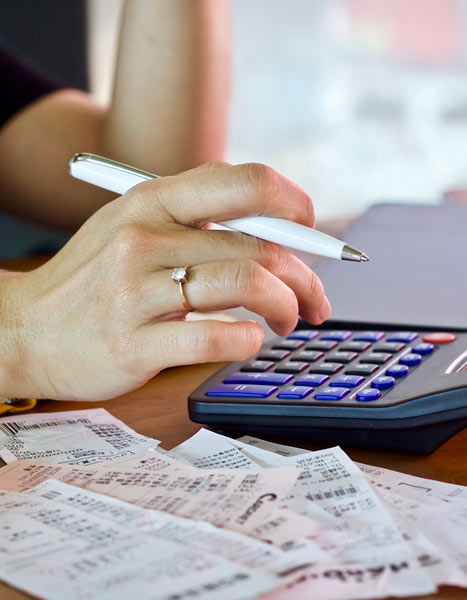A We all need a system for managing and paying bills. But it should be one that suits
our own needs and helps us stay in control of our finances. A pile of bills gathering
in a drawer can stress you out. And unpaid bills will cost you more if you have to pay
late-payment fees or if you lose track of what has been paid.
This factsheet will help you create a system that works for you. It provides
information on how to manage and pay your bills. It also includes an Action Plan to
help you plan what you need to do and when to do it. A system will work better if it is
based on realistic budgeting. If you need help making a household budget, go to the
MABS website, www.mabs.ie and use our handy Budgeting Tool or request a ‘Guide
to Budgeting’ leaflet.
Step one – Organise your bills
- Collect all of your bills and keep them together in one place. A good way of sorting and storing bills is to use an accordion file, which you can buy from a stationers. If you pay most of your bills online, you can use an Excel spreadsheet to keep track of them. Some people also keep track of their bills by using large envelopes,with the name of the utility company or creditor written on each envelope. The only downside to this method is that the bill isn’t visible and you could forget about it.
- When a bill comes in, check the payment date to see how urgent it is – the payment date will usually be clearly marked. You may also be warned of what the penalty is for late payment.
- Decide on a schedule to pay your bills so that the costs are evenly spread out. If possible, avoid paying a number of bills at the same time, as this could leave you short of money for that week or month.
- Ask about changing a bill’s due date if it would be easier for you to pay at a different time of the month. Contact the service provider directly to discuss your options.
- MABS has a ‘Helping Hand at Home Planner’. This calendar helps a family plan it’s weekly and monthly expenditure by identifying when each bill needs to be paid. You put stickers on the calendar to show when the bills are due. Contact MABS for your free copy.

Step two – Make a budget to pay your bills
- Many bills come in every second month, quarterly or annually. It’s important to take account of those bills in your weekly or monthly budget to avoid a big expense at certain times of the year.
- List all of these bills, such as car tax, insurance, the NCT charge, back-to-school costs and anything else that has to do with your home. Add up all the costs and divide by 12 if you are preparing a monthly budget or by 52 if you are working on a weekly budget.
- Put this money aside each week or month (preferably in a savings account) so that you will have enough to pay these bills when they come up.
- If possible, put aside even a small amount of money each month to save for unexpected costs or events.
Step three – Pay your bills at a regular time every week or month using any of the following methods (*MABS does not endorse any particular bill payment service)
- BillPay is a free bill payment service from An Post. BillPay allows you to choose how
- you want to pay your bill – at your local Post Office or online (see Mybills.ie below). BillPay can be used to pay a wide variety of bills, such as electricity or gas bills, your TV licence, and phone and waste charges. You get a receipt which will help you keep track of your payments. You can pay as much or as little off your bill as you like each time
- (as long as it is within the limits set by the company you’re paying it to).
- Mybills.ie is a free service from An Post for paying bills online. You can pay as much or as little off your bill as you like each time (as long as it is within the limits set by
- the company you’re paying it to) or set up automated payments each month. You can make a once-off payment without registering, but regular users of the service have to register at www.mybills.ie. You’ll need a debit card or bank account to use this service.
- PostPoint is available in many shops nationwide. It allows you to pay household bills, top up mobile phones, buy international calling cards and stamps. The service is free,there are no delays and you can choose to pay all or part of a bill. Look for the
- PostPoint sign. Remember to bring your bar-coded bill or payment card with you when you go to make a payment.
- PayPoint offers an easy and convenient way to pay many household bills, top up
- mobile phones and international calling cards and much more. This service is available at a wide variety of convenience stores and credit unions.
- Payzone is a bill-paying service for household bills, pre-pay utility meter cards and the Local Property Tax. It’s available in a network of retail outlets nationwide. Look for the Payzone sign. The service is free in some stores but not all, so check first.
- Household budget scheme is a free service for people who get certain social
- welfare payments that are paid through the Post Office. Under the scheme, an agreed amount will be deducted from your social welfare payment and paid towards various household bills (e.g. local authority rent or mortgage, rent to a housing body or payments to Electric Ireland, Bord Gáis, Eircom or Airtricity). The total amount deducted and paid towards bills will not be more than a quarter (25%) of the amount you receive. The Household Budget Scheme can only be applied if your social welfare payment is paid through An Post. If you sign up to pay your local authority or housing body rent or mortgage with this scheme, note that you cannot opt out of it later unless you have the permission of the local authority or housing body.
- Payment card schemes such as Easy Pay from Electric Ireland allow customers to make smaller, regular payments on their utility bills instead of waiting for a
- big bill to arrive. You can make payments in your local post office or through a
- PostPoint or PayPoint outlet.
- Budget plans are available from most energy providers and allow you to spread out payments over the year. They calculate your monthly payment by estimating the cost of your expected energy usage over the year and dividing it by 12. This option is only available to customers who pay by direct debit.
- Pre-paid meters are available from most gas and electricity suppliers and allow you to pre-pay for your electricity or gas. You receive a top-up card and can buy credit at PostPoint, PayPoint or Payzone outlets or online using a debit or credit card.
- Direct debit is a convenient way to pay regular bills through your bank account. You can set up direct debits for your monthly bills so that when a bill payment is due, the money will be taken directly out of your bank account (without needing a signature or any further authorisation). Watch out for setting up direct debits too close to the payment date in case of payment or banking delays! You can also
- set up or cancel direct debits online. You must notify your creditor that you have cancelled a direct debit.
- Standing orders are a convenient way to pay a fixed amount for a mortgage, rent, a loan or a debt through your bank account. However, standing orders are not usually suitable for paying bills where amounts vary from month to month, such as credit cards or utility bills. There may be an initial charge to set up a standing order and then a transaction charge each time the payment is taken from your bank account. Standing orders can be set up by contacting your bank, but can also be set up, changed and cancelled online.
- Internet/phone banking allows you to use bank services to pay bills from your
- Cheques are a simple and secure way to pay bills. Just fill in the details and keep
- a record of the payment on the cheque stub. Write the account number you have with your service provider on the back of the cheque to ensure it goes to your account.
- Debit cards and credit cards allow you to pay bills in a wide variety of ways – in person, online or by phone. A debit card payment means money is taken from your bank account but a credit card allows you to make purchases on credit and pay for them later. Remember to check the cost of using a credit card and what the bank penalties or fees will be if you’re late in making a repayment.
Many of the banking services described overleaf charge fees. Ask your bank if you’re eligible for free banking. If you are eligible, it will mean you will pay no transaction charges, and this will reduce the cost of paying your bills. If you want to open a bank account consider opening a basic bank account which has no transaction charges or maintenance fees for at least 12 months and will reduce the cost of paying your bills.
If you are running short on cash, there are a number of ways you can help yourself. Here are some ideas:
- Prioritise your bills. If your budget is tight, cut out any non-essential items or
- unnecessary expenses.
- Shop around for the best deals, but check whether the deal really is a good one or just a marketing gimmick.
- Remember: a bargain is only a bargain if you need the item.
- Grocery shopping can be a significant cost in many households. Try to reduce grocery bills by buying supermarket-own brands, shopping in discount stores or using coupons wherever possible.
- Think about shopping around for services as well as for goods. There are lots of good comparison websites that help you compare the cost of services from different suppliers.
- Talk to your creditors to re-negotiate credit terms or spread out bill payments.
- If you are receiving a social welfare payment, consider using the Household
- Budget Scheme to help organise the payment of your bills.
- Check if you are eligible for tax and social welfare supports that help employees on low pay. For instance, the Family Income Supplement is a weekly tax-free payment available to employees with children. Details of this and other supports are available from your local social welfare office or online at www.welfare.ie or www.citizensinformation.ie.
- If you are in debt on your gas or electricity bill and at risk of being disconnected, talk to your service provider about getting a pre-pay meter.
- Contact the MABS Helpline on 0761 07 2000 (Monday to Friday, 9am–8pm)
- for help or guidance on what to do next If you need help with budgeting or are struggling with repayments.

The Money Advice and Budgeting Service has helpful information, budget sheets and sample letters available online at www.mabs.ie. Advice and information is also available by calling the MABS Helpline 0761 07 2000 (Monday – Friday 9.00 am to 8.00 pm.) and from over 60 offices nationwide.
Disclaimer
Every effort is made to ensure that the information in this publication is accurate. However, no responsibility is accepted by MABS National Development Limited, its funders or the MABS for any errors, omissions or misleading statements on these pages. The information is of a condensed and general nature only and can change from time to time. Readers should, therefore, verify any information on which they rely by contacting the MABS Helpline 0761 07 2000.








